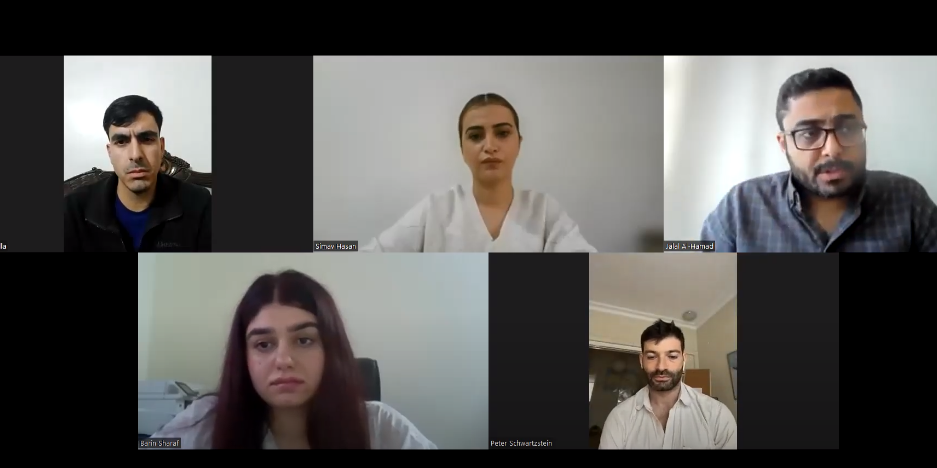On 16 November 2023, Syrians for Truth and Justice (STJ), in cooperation with Synergy Association for Victims, Justice for Life (JFL), and Humanitarian and Development Cooperation (HDC), held a ZOOM panel discussion titled “The Journey of Water: The Battle against Scarcity in Northeastern Syria.”
The panel consisted of four speakers: Peter Schwartzstein, journalist and environmental consultant; Barin Sharaf, Synergy Communications and Advocacy Officer; Belend Malla, HDC Executive Director; and Jalal al-Hamad, JFL Executive Director.
The attendees were a cohort of activists, researchers, decision-makers, and others interested in water security and water-related diseases prevalent in the area.
The panelists discussed developments in the water situation in north-east Syria (NES) and civilians’ hampered access to water resources due to recurrent Turkish strikes on vital facilities in al-Hasakah province and its countryside, as well as the recent clashes between the Syrian Democratic Forces (SDF) and tribal fighters in Deir ez-Zor province.
Additionally, the panelists addressed the impact of the weaponization of water throughout the conflict, which has been ongoing for over a decade. They focused on the repeated disruptions of the Alok Pumping Water Station and the repercussions of water cuts on the local community and its stability—especially given the region’s dire economic conditions and the proliferation of water-related illnesses and epidemics.
Topics Discussed
Schwartzstein shed light on the historical trajectory of the present drought in the region, discussing climate change, the Syrian government’s mismanagement of water, and the weaponization of water throughout the conflict. He pointed out that policies pursued by successive Syrian governments have drained communities by forcing them to grow water-intensive crops without developing irrigation and agricultural rationalization methods.
Schwartzstein also touched on transboundary water challenges and the damming of watercourses shared by Syria and neighboring Turkey, where rivers originate, stressing that this practice has exacerbated the water crisis in the NES and added layers to the difficulties caused by the many droughts the area has had since the turn of the century.
Additionally, he pointed out that “water has become a weapon States use against rivals. The world has seen many such instances,” adding that States no longer respect international law due to several infringements on its provisions.
He also highlighted that there are no easy or ready-made solutions to the water crisis, adding, however, that the first step lies in the States’s conformity to water-related provisions of international humanitarian law and exerting local and international pressure on those involved, particularly Turkey, to meet their obligations and amend their water policies.
For her part, Sharaf talked about the October 2023 Turkish airstrikes on water and electricity stations, which did not even spare hospitals in the NES.
She addressed the level of damage that befell the already dilapidated infrastructure. Sharaf said that the deliberate destruction of infrastructure is a human rights violation, with which Turkey has breached international humanitarian law and international human rights law.
Furthermore, she flagged the repercussions these strikes pose to local communities, especially under the enduring difficulties of accessing sustainable water supplies in various areas across the NES, focusing on the recent hostilities’ impacts on the region’s agro-economy, stability, civil peace, and cultural identity. She also mentioned the multiple additional financial burdens locals had to suffer while already grappling with adverse living conditions.
In his turn, Malla shed light on the Khabur River crisis, tracing it back to the early 2000s, when the river became a seasonal resource. The river flow rates declined and were perceivable only in winter, which denied several cities, including al-Hasakah, access to a previously sustainable water source.
Additionally, Malla highlighted how the weaponization of water robbed local communities of the little options they had given the Khabur’s condition. After the river began to diminish, a water pumping station was established in Alok village in Ras al-Ain/Serê Kaniyê city to provide the region with clean supplies. However, the station was rendered ineffective after the Turkish military and armed groups of the opposition’s Syrian National Army (SNA) took over the area in the aftermath of Operation Peace Spring in 2019. The Turkish military and armed groups used the water station as a tool to pressure local authorities, denying al-Hasakah and surrounding villages and displacement camps the only sustainable source of water they were left.
Malla also reviewed interventions to resolve the dispute around the Alok Water Station and get supplies running after disruptions. Two such interventions occurred: one by the U.S.-led Coalition to Defeat ISIS, started in response to pressure from local civil society organizations, and the other by the UN, whereby Russia mediated talks between the Turkish military and SNA armed groups on the one hand and the Syrian government and the Autonomous Administration of North and East Syria on the other.
From his side, al-Hamad discussed the consequences of limited water availability and provided information about the cholera outbreak in Deir ez-Zor, including the risks it posed to the local population, the emergency steps taken to contain it, and the possibility of future outbreaks. He pointed out the shortcomings of the approach adopted by civil society organizations and local authorities to curb the epidemic’s spread and provide locals with clean water. Al-Hamad also elaborated on how adversely the recent unrest in the province affected the province’s water security, especially as clashes obstructed the services of water stations.
At the end of the discussion, the panelists necessitated that concerned parties, international and local, invest further efforts to commit to the water policies they have established. They also urged relevant organizations to train local communities on adjusting their water-related norms and prepare them for worst-case scenarios, given worldwide indicators that entire populations are at risk of eradication due to droughts and water deprivation.
To view the full session, please click the link.

